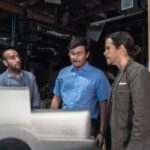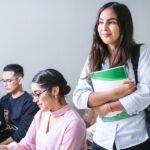Since April, millions of us have quit, retired or become our own bosses. Indeed, the so-called Great Resignation has emerged as one of the stories of 2021. With only a week left before the new year, there are five million more jobs than workers. Yet there exists a largely invisible workforce that would fit many of these abandoned jobs perfectly. One fast-growing organization is working to bridge the gap between employers and workers by transitioning a neglected population into self-sufficiency.
The Next Step Programs (TNS) was created in 2015 to break down barriers that prevent people with disabilities from finding educational and employment opportunities after high school. Joshua Fields co-founded TNS at just 16 years old after volunteering as a counselor at a PALS Programs, a camp for young adults with Down syndrome. “It was like I was being pulled toward this community,” he remembers. “I wanted to address the stigma against people who weren’t considered ‘typical.’”
Now 23, Fields is already a veteran of the disability rights movement. Out of college, he learned how to write about disability policy as the Communications manager for one of the state’s leading disability rights groups, and he helped establish a postsecondary program designed for people with disabilities at his alma mater, Penn State. “As a person without a disability I had access to so many opportunities,” he says, “but my friends didn’t have the same tools that I had to be successful.”
He’s hopeful that with employers in dire need of workers, the time may be ripe for change. Fields has focused TNS’ efforts around three major initiatives:
Education
TNS educates individuals with disabilities, parents, teachers and the community at large to ensure that its participants gain the skills needed to be successful and independent. Programs focus on bolstering skills in communication, employability, self-advocacy, independent living and teamwork.
“The lack of opportunities for people with disabilities is a function of both a lack of education preparing people with disabilities and a lack of education preparing employers in how to train people with disabilities and remove barriers,” Fields observes.
As TNS’ director of programs, he’s created dynamic “soft skill” and community building programs for young adults with and without disabilities alike. These programs include transition social groups that teach life skills like social media safety, as well as other technology-centered abilities demanded by 21st century employers. There are also cooking and fitness classes, programs that teach personal health and kitchen safety, independent living courses, and career exploration classes.
Advocacy
“We spent the first five or six years studying everything we could about transitions so we could speak on behalf of the community,” Fields recalls. “But we also spent a lot of time learning the issues in schools and in the community at large. A lot of our advocacy is teaching young volunteers to advocate for their friends with disabilities.”
Fields says that the transition period after high school is especially tough for people with disabilities. Many lose benefits when they turn 21. TNS has developed workshops that both advocate and educate the importance of inclusion for these folks.
A major target audience is employers. TNS not only educates on how to remove workplace barriers but shines a light on the benefits of hiring people with disabilities, including higher retention rates. Fields is currently developing a model called job trainers, where TNS advocates teach both the employer and the employee with a disability on how to work together. Then they step away. “We don’t want to have to be a constant support because they don’t need that,” Fields says. “We want to build sustainable models of independence for people with disabilities.”
Far too often people with disabilities aren’t even given the chance to have their voices heard, he says. So TNS also advocates for societal change, too, by educating communities about integrated living, employment and job support. The organization leads by example. Individuals with disabilities serve as members of the TNS staff team, as well as on the Board of Directors.
Innovation/Inspiration
TNS’ third objective is to innovate and inspire creative thinking. People with disabilities are often relegated to the shadows, so sharing stories, and celebrating participants are victories in and of themselves. “You give individuals the access and opportunities to do everything their peers are doing and you inspire them to do great things,” Fields says. “One of our participants is a DJ and we hired him to run our last event, to help his career get off the ground.”
The TNS website features a half-dozen stories of other participants, including a 21-year-old gamer with a disability named Jake who echoes Fields’ sentiment. “If someone can’t do something as well as you can, there’s something else they can probably do as good as you or even better than you,” Jake says. “Don’t judge a book by its cover.”
Six years on, Fields thinks that there’s nothing like TNS. More than just an organization that works with people with disabilities, he says it’s evolved into a human rights organization that’s leveling the playing field. “People with disabilities represent every race, every gender, every culture, every ethnicity, every socio-economic class. It’s important for people to realize how intersectional disability is with all of us. Everyone has a right to do what they want to do, and what makes them happy. It’s such a simple premise but people with disabilities don’t always have that option. It’s all about showing them that anything is possible.”
















